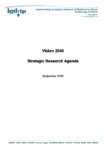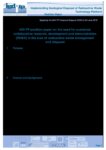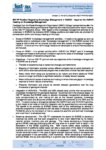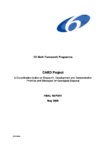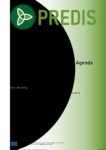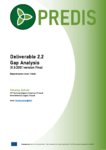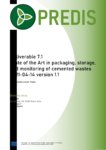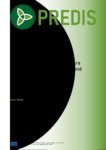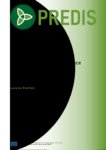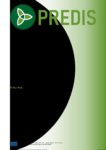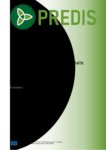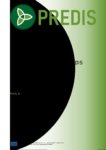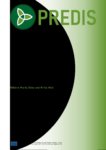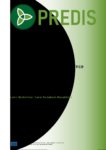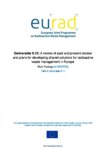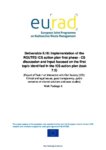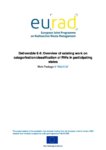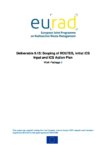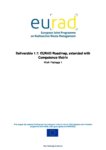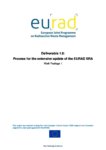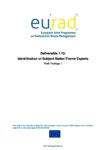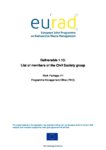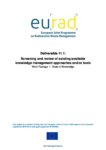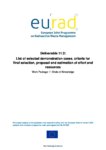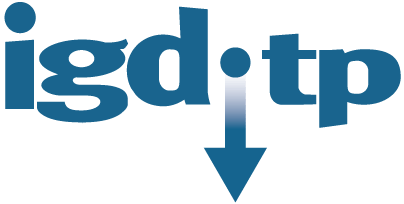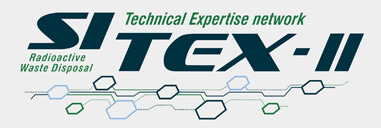Key Topic 9: Knowledge Management
The management of knowledge in repository development is one of the major challenges over the lifetime of a waste management programme. It covers all data and information and in particular the basis of the decisions made, which is a major requirement for the creation and preservation of knowledge related to openness, traceability and transparency.
Overview
This research area involves networking activities that contribute to all three pillars of the 2040 Vision, as maintaining knowledge, competencies, skills and infrastructure are vital to safely and efficiently implement, operate and close radioactive waste disposal facilities. The Knowledge Management (KM) research area encompasses all knowledge that supports a geological disposal facility, which is broader than just the science and technology that underpins the safety case – it includes the reasons why systems have been designed and implemented as they have, why decisions have or have not been taken, and why options are selected or not. It is as important to identify and treat obsolete, superseded knowledge as it is to gather and share new knowledge, in order to avoid repeating previous work. KM also covers competence maintenance, education, and training, as well as information/data management.
Knowledge is the nuclear industry’s most valuable resource, without which the industry cannot operate safely and economically, and is vital for all stages of a nuclear facility’s life cycle: research and development, design and engineering, construction, commissioning, operations, maintenance, refurbishment and closure. Such knowledge is also complex, expensive to acquire and maintain, and can be easily lost. Key challenges to KM in the nuclear industry, and for geological disposal in particular, include:
- The nuclear industry has an ageing workforce and significant, tangible and intangible, knowledge is at risk due to personnel retirements.
- In countries with stagnating nuclear energy programmes and/or a policy for nuclear phase out, or countries that do not have a nuclear energy programme, it is challenging to secure sufficient human resources, but to also obtain sufficient funding to continue to maintain infrastructure, experimental facilities and research.
- Geological disposal is a large-scale infrastructure project with an unusually long timescale, both during the RD&D phase prior to licensing and then during the long construction, operational phase and monitoring phase. A challenge unique to geological disposal is that knowledge must be maintained without real activity for some decades.
Multiple approaches to KM are in use, including amongst IGD-TP member organisations. The many approaches applied are all valid, but there is a need to have a common WMO KM strategy in order to make effective use of common expertise, knowledge and systems. The IGD-TP can be a continuous link for consistency and KM across all WMOs, acting as a vehicle to manage the combined WMO KM needs.
There are many existing initiatives, with both the IAEA and NEA having undertaken work in this area for a number of years. It is important to complement existing initiatives, not to duplicate them (i.e. identify where there are gaps). There are many aspects to KM that must be maintained by WMOs, including the reasons for the strategies implemented and management decisions made, in addition to fundamental scientific and technological knowledge. Many international projects tend to concentrate on scientific and technological KM only. Currently ongoing activities include:
- an NEA initiative on information, data and knowledge management (IDKM);
- IAEA knowledge management activities;
- EDRAM Knowledge Management Working Group;
- EURAD Knowledge Management Work Packages; and
- KM activities within each WMO.
An important aspect to note is that writing documents is only one part of KM; there is also a need for continuity of knowledge held within the working community. In some areas sufficient information to underpin geological disposal has already been obtained and so limited further research is being undertaken, which means staff knowledge is not being maintained and has the potential to be lost when the last expert in that area retires. However, expertise on such topics needs to be maintained for several decades so questions can be answered and the impact of new research findings assessed. Collaboration between WMOs to finance such expertise maintenance without unnecessary duplication is an option to be considered further.
Another area in which WMOs are considering their ability to collaborate to cost-effectively maintain knowledge is with regard to the maintenance and retention of specialist infrastructure, such as laboratories (including hot cells) and underground research facilities. Whilst such facilities need to be maintained, no need is seen for each WMO to fund such in every member country; pragmatic rationalisation would be sensible. Equally, and particularly with respect to countries that have taken the decision to phase out nuclear energy and/or small inventory member states, there is a danger that unique facilities and expertise may be lost as national funding may be reduced or withdrawn; it is possible that unique at-risk infrastructure could be collaboratively funded by WMOs to ensure its continued existence and that of the experts using them. This would effectively create an international pool of experts who could be called on by all WMOs as the need arises.
A number of the WMOs who are owned by commercial organisations (i.e. waste producers), rather than national governments, have established business models (or commercial arms) that provide expertise in radioactive waste management and disposal. These form another vehicle by which knowledge can be maintained and passed on. Some early stage and small inventory members have found the services of these commercial organisations useful because they can be contracted to provide specific support as and when needed (e.g. to support development of work plans and to help interpret data in the context of the specific situation). As a number of IGD-TP WMOs are funded directly by national governments, the IGD-TP does not officially endorse a business model approach to KM, but it does recognise that this is one route to maintain and share knowledge.
Objective
Objectives in this research area are to:
- Develop a common WMO KM strategy in order to make effective use of common expertise, knowledge and systems.
- Facilitate knowledge transfer between more advanced programmes and early stage programmes (e.g. through training, face-to-face knowledge transfer, forging close links and ensuring collaboration between WMOs, and by making reports open-access where possible).
- Preserve capability (competencies, skills, infrastructure, etc) and ensure its transfer between generations over the long timescales of geological disposal.
- Avoid unnecessary duplication of work by mapping the information that has been acquired and research progress that has been achieved thus far across different programmes (this also helps facilitation of knowledge transfer between advanced and early stage programmes).
- Identify the areas that are considered to be sufficiently mature and where additional RD&D would no longer contribute to significant reduction of safety-relevant aspects, and also identify the priority knowledge gaps that need addressing in order to further reduce significant uncertainties.


